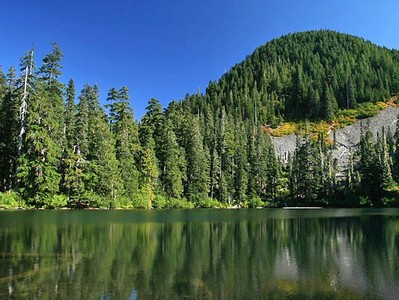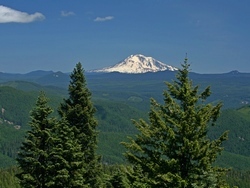Introduction
The United States Congress designated the Trapper Creek Wilderness
in 1984 and it now has a total of 5,969 acres. All of this wilderness
is located in Washington and is managed by the Forest Service.
Description
 Trapper Creek Wilderness protects nearly all of the Trapper Creek drainage
and provides the only pristine anadromous fish habitat in the Wind River
watershed. Sparkling streams and waterfalls grace steeply dissected canyons
of heavy timber. Spotted owls, pileated woodpeckers and goshawks enjoy the tall,
old-growth Douglas-fir forests that comprise the heart of this wilderness.
Soda Peaks Lake, the area's single body of water, gleams from a cirque below
Soda Peaks in the southwest corner. Observation Peak, the site of a former
fire lookout, offers sweeping views of Mount St. Helens, Mount Rainier, Mount Adams, and Mount Hood.
Trapper Creek Wilderness protects nearly all of the Trapper Creek drainage
and provides the only pristine anadromous fish habitat in the Wind River
watershed. Sparkling streams and waterfalls grace steeply dissected canyons
of heavy timber. Spotted owls, pileated woodpeckers and goshawks enjoy the tall,
old-growth Douglas-fir forests that comprise the heart of this wilderness.
Soda Peaks Lake, the area's single body of water, gleams from a cirque below
Soda Peaks in the southwest corner. Observation Peak, the site of a former
fire lookout, offers sweeping views of Mount St. Helens, Mount Rainier, Mount Adams, and Mount Hood.
Trails to Soda Peaks Lake and Observation Peak total 12 miles. Another 12.4
miles of primitive trails, including the Trapper Creek Trail, provide loop
opportunities through the middle of this wilderness. These primitive trails
are maintained to a lesser standard and can be challenging to follow.
Observation Peak Trail provides access to the adjacent Bourbon Creek drainage.
Trapper Creek Wilderness consists of 6,050 acres of diverse habitat located
in the central portion of the Wind River Ranger District in the southern Cascades
of Washington. The lower elevations typify an old-growth Douglas-fir forest while
the higher elevations are characteristic of a second-growth Douglas-fir forest.
Sparkling cascading streams and waterfalls are plentiful throughout the steep
slopes at the lower elevations, while huckleberry fields occur in the higher elevations
near Observation Peak. A small lake in the southern portion of the Wilderness
adds to the diversity of habitats in the area.

Spotted owls inhabit the Wilderness as well as barred owls, pileated woodpeckers
and goshawks. Animals commonly seen in the area include black tail deer, Roosevelt
elk, and black bear. Cougar, bobcat, and pine marten can be seen occasionally.
Observation Peak, the location of a former lookout, offers sweeping views of
Mount St. Helens, Mt. Adams, Mt. Rainier, and Mt. Hood. The lookout was established
by 1917 to detect forest fires that were prevalent in the first quarter of this
century. Access to Observation Peak is via Trail #132 which has historic use prior
to 1917.
Trails #132, #132A, #133, and a short portion of #192 were constructed by the
Forest Service and are maintained annually. All other trails in the area were
constructed and are maintained by the Mazamas, a mountaineering organization based
out of Portland, Oregon. The Mazamas trails are classified as "primitive".
Although they offer a unique Wilderness experience, be aware that they are steep
and sometimes difficult to follow.
Areas of Interest Nearby
Areas of interest adjacent to Trapper Creek Wilderness are Government Mineral
Springs Recreation Area and Sister Rocks Research Natural Area. Mineral water
is available at Iron Mike well at Government Mineral Springs. In addition to the
mineral springs, several summer homes are located in the area of Government Mineral
Springs. The homes are under a special use permit to the Forest Service but are
privately owned. Please be courteous and conscientious if you hike near the summer
homes.
Sister Rocks Research Natural Area was established in the mid-1950's as an
example of a Pacific Silver Fir climax forest. Research studies are ongoing in
the Natural Area. Huckleberries grow adjacent to the Natural Area to the south.
Permits
Remember, Wilderness Permits are required when you enter any wilderness area in the Gifford Pinchot National Forest.
Click Here for more information.
Rules
Click Here for PDF on Restrictions
Gifford Pinchot
Oh, by the way, who was Gifford Pinchot?
Click Here for more information.